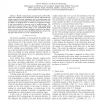936 search results - page 28 / 188 » The Timewheel Group Communication System |
GLOBECOM
2006
IEEE
14 years 1 months ago
2006
IEEE
— Mobile communication systems based on DS-CDMA suffer from multiple access interference (MAI), which limits the system capacity. Several techniques, such as beamforming with mul...
SRDS
2000
IEEE
13 years 12 months ago
2000
IEEE
Group communication systems are powerful building blocks that facilitate the development of fault-tolerant distributed applications. Such systems generally run in an asynchronous ...
ICC
2007
IEEE
14 years 1 months ago
2007
IEEE
Abstract— Adding SDMA capabilities to modern wireless communication systems like IEEE 802.16 WiMAX promises high system capacity gains but raises the problem of combining orthogo...
HICSS
2005
IEEE
14 years 1 months ago
2005
IEEE
Virtual teams and their leaders are key players in global organisations. Using teams of workers dispersed temporally and geographically has changed the way people work in groups a...
SRDS
2003
IEEE
14 years 24 days ago
2003
IEEE
In multipeer communication decentralised probabilistic protocols have received a lot of attention because of their robustness against faults in the communication traffic and thei...

